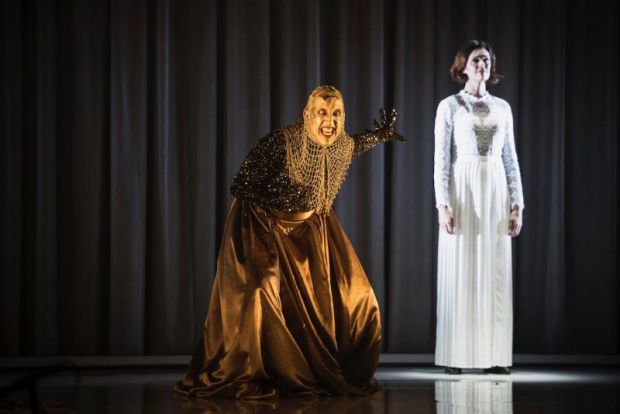Music: Henry Purcell. Libretto: Nahum Tate. Prologue: Kate Mulvany. Pinchgut Opera. City Recital Hall. 30 May – 3 June, 2024
Reviewed : 30 May, 2024*

Purcell’s opera, based on Book IV of the poet Virgil’s Aeneid, tells of the love affair between Dido, Queen of Carthage, and the Trojan hero Aeneas, who abandons Dido to pursue his own destiny – the establishment of the city of Rome. A contemporary Dido might have happily waved him farewell, content to rule the strong city that she had established after her brother rejected her and killed her husband. But Dido “lived” in ancient Greece, where males ruled and women, even those who were strong, succumbed to lust and romance – and the will of the Gods.
Australian playwright Kate Mulvany has written a new Prologue, using the sorceress to recount the complex context of the opera. Who better than the very versatile, Helpmann Award winning tenor Kanen Breen to portray that sorceress. Shrouded in gold, he snakes around the stage, explaining the god-induced backstory: Juno protecting Dido, Venus controlling of Aeneas; Cupid firing his little arrows at Dido to instigate a love match that will not be allowed to survive.

Breen’s acting is as compelling as his voice. There is menace in his gold expressive face, in the words he sings so threateningly and in the concentrated intensity of his gaze as he watches the story he has introduced unfold.
In Carthage, Dido is surrounded by happy townspeople and her faithful friend, Belinda.
Valda Wilson is a stately, elegant Dido, whose clear soprano voice reaches high into the lofty ceiling of the Recital Hall. There is gentle strength and kind authority in the Dido she portrays as she walks in white among her courtiers, who, with Belinda, played by Sara MacLiver, persuade her to forgo her vow never to fall in love again and admit her feelings for Aeneas.

Wilson and MacLiver’s voices blend beautifully as they consider the pros and cons of this ill-fated love affair – while David Greco, as Aeneas, in his powerful baritone vows to renounce his destiny and give up the idea of founding the city of Rome.
Pinchgut brings these four much-lauded Australian voices together in Purcell’s “only true opera” with an ensemble of strong singers who play both the people of Carthage and the witches who, with the sorceress, plot against Dido.
A feeling of melancholy pervades in much of the music – apart from the lusty “First Sailor’s Song” and the gentle dance of the townspeople. The sad notes of “Dido’s Lament” echo in the mind as does the impression of this final scene in director Lucy Clements’ production. Dido, in red, sinking on to Belinda’s knees and being encompassed in her arms as she sings “When I am Laid in the Earth” is a poignant image.

Clements and designer Jeremy Allen have opted for simplicity, relying on colour and choreography to highlight the voices and the music. Gold, white, black, grey, red and sparkling beading predominate. The only props, the sorceress’s chair, some blankets and bouquets of flowers, add to the production by suggestion, concentrating the attention on the singing and the acting.
The choreography by movement director Shannon Burns of the dance in Act 1is beautifully conceived and performed with stylised control by the ensemble to the immaculate playing of the Orchestra of the Antipodes conducted, as always, by Erin Helyard.
Pinchgut Opera’s Dido and Aeneas comes at an opportune time to add a beautiful baroque contribution to Sydney’s “vivid” beginning of winter.
First published in Stage Whispers magazine
*Opening Performance